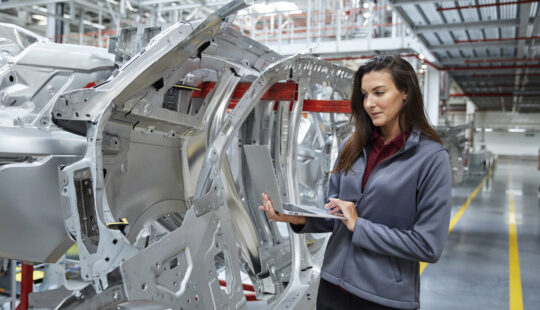The latest report by the Intergovernmental Panel for Climate Change makes it clear that the window to limit the world-threatening impacts of climate change is closing. While many companies and countries have pledged net-zero targets or promised to reduce their carbon emissions, much more needs to be done urgently to mitigate and adapt to climate change.
Global engineering and IT conglomerate Hitachi is committed to making the “decarbonization of society” a reality. Through its sustainable business practices and its public-private partnerships, it acts as a catalyst for climate action from the inside out.
Hitachi and SAP believe in bringing profit and planet together. As Alistair Dormer, chief environmental officer and executive vice president of Hitachi Ltd., says, “Decarbonization is good for the environment and good for business.”
Utilizing technology solutions to address climate change, Hitachi shows how digitalization and the decarbonization of society can coexist by taking the following steps.
Empowering Employees as Sustainability Ambassadors
Hitachi empowers its employees to step up as sustainability ambassadors and embody its philosophy of “powering good.” Employees across all levels of the organization are encouraged to deliver sustainability value through business activities and as global citizens. Hitachi uses digital e-learning tools to promote greater environmental awareness and has a specialized group training on environmental risks and compliance once a year. It is also integrating sustainability into executive key performance indicators, providing financial and sustainability performance links to motivate employees to take actionable steps to mitigate climate change.
Decarbonizing Core Operations
In 2021, Hitachi pledged to be carbon neutral in its operations by 2030, as part of its Sustainability 2030 plan. To reach this ambition, Hitachi uses solar, wind, and other forms of renewable energy at many of its business sites. Nine of its sites across the United States, Europe, and Japan have completely transitioned to using 100% renewable energy. Its rail business in Italy installed solar panels on its factory roof, which is expected to save the site 30% in energy costs, illustrating firsthand that companies can see financial returns on environmental investments. Through these types of transformative changes, Hitachi is closing the gap to reaching its carbon neutral ambitions.
Creating Accountability across the Value Chain
In addition to going green in its own operations, Hitachi pledged to achieve carbon neutrality across its entire value chain by 2050. Business leaders at Hitachi recognize that to advance its bold vision to decarbonize society, it must extend its influence beyond the boundaries of its own business processes. As a lead manufacturer in the transportation industry, Hitachi aims to make sustainable transportation options more extensive and accessible. By reimagining transportation, Hitachi hopes to digitalize the future of transport and simultaneously improve the whole passenger journey while making the environment a top priority.
Scaling with Ecosystem Partners
Hitachi has developed an expansive ecosystem of multi-stakeholder partners to advance its sustainability objectives and has been a key customer of SAP for over 25 years. Today, Hitachi runs a large majority of its enterprise resource planning (ERP) systems on SAP software and is transitioning to SAP S/4HANA. To further Hitachi’s sustainability strategy, it recently held several sustainability workshops for various global business units with SAP.
“Digital transformation plays a fundamental role in the realization of Hitachi’s ambitious climate goals,” shares Dormer. “Hitachi’s long-standing partnership with SAP continues to advance our sustainability efforts and sets us up today to be a profitable and sustainable business tomorrow.”
Hitachi also firmly believes that the public and private sector must collaborate to achieve long-lasting change and cooperates closely with governments and key intergovernmental institutions to tackle climate change together. Hitachi joined the UN Race to Zero campaign and was the first Japanese company to serve as a principal partner of COP26, the recent climate change conference in Glasgow.
Recently, Hitachi worked on an Office of Gas and Electricity Markets (Ofgem) funded innovation project to develop the UK’s electric vehicle (EV) infrastructure through digital innovation. Working with a consortium of partners, it created a system to collect and analyze data from vehicles and the network of charging stations to optimize EV charging in the most efficient way. By sharing best practices and engaging in capacity building activities, Hitachi not only sets a strong example but also enables other actors to realize their sustainability ambitions.
Finally, Hitachi is investing over 11 billion Euros over a three-year period on research and development of high-efficiency products, energy management systems, and hydrogen-related technologies to help unlock digital innovation to achieve a decarbonized society. This research will be beneficial not only to Hitachi, but also to other cities, governments, and companies looking to reduce emissions and make a positive impact on the environment.
As a front-runner in the sustainability space, Hitachi offers a powerful example of how organizations can accelerate climate action from the inside out. Hitachi empowers and educates its employees and leverages the power and reach of digital technologies to accelerate its progress towards its Sustainability 2030 plan. SAP is proud to work with Hitachi and to showcase the innovative ways in which our customers are taking concrete actions towards tackling climate change and working with other global players. We are all in this together.
To learn more about SAP’s sustainability initiatives, visit sap.com/sustainability.
Vivek Bapat is senior vice president of Purpose and Sustainability Marketing at SAP.



